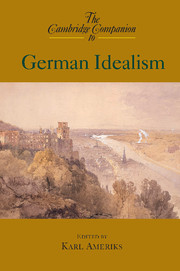Book contents
- Frontmatter
- Introduction
- 1 The Enlightenment and idealism
- 2 Absolute idealism and the rejection of Kantian dualism
- 3 Kant’s practical philosophy
- 4 The aesthetic holism of Hamann, Herder, and Schiller
- 5 All or nothing
- 6 The early philosophy of Fichte and Schelling
- 7 Hölderlin and Novalis
- 8 Hegel’s Phenomenology and Logic
- 9 Hegel’s practical philosophy
- 10 German realism
- 11 Politics and the New Mythology
- 12 German Idealism and the arts
- 13 The legacy of idealism in the philosophy of Feuerbach, Marx, and Kierkegaard
- Bibliography
- Index
6 - The early philosophy of Fichte and Schelling
Published online by Cambridge University Press: 28 May 2006
- Frontmatter
- Introduction
- 1 The Enlightenment and idealism
- 2 Absolute idealism and the rejection of Kantian dualism
- 3 Kant’s practical philosophy
- 4 The aesthetic holism of Hamann, Herder, and Schiller
- 5 All or nothing
- 6 The early philosophy of Fichte and Schelling
- 7 Hölderlin and Novalis
- 8 Hegel’s Phenomenology and Logic
- 9 Hegel’s practical philosophy
- 10 German realism
- 11 Politics and the New Mythology
- 12 German Idealism and the arts
- 13 The legacy of idealism in the philosophy of Feuerbach, Marx, and Kierkegaard
- Bibliography
- Index
Summary
German idealistic thinking can be approached in many different ways, each of which has peculiar advantages and problems. According to the standard view, the German idealist movement is best looked at as a philosophical program that was developed in the wake of Kant's Critical philosophy with the intention of improving his transcendental idealism in various directions. The now-dominant version of this view has it that, starting with K. L. Reinhold, a whole generation of young German philosophers embarked on the project of arriving at new foundations for Kant's philosophy, of distinguishing what was taken to be the highly promising spirit of his philosophical conception from its rather poor literal expression by Kant himself, and of providing the missing premises for the conclusions of his theory. Although this project was approached from very different points of view by each of the main figures of that movement - J. G. Fichte, F. W. J. Schelling, and G. W. F. Hegel - there were some convictions that they shared.
- Type
- Chapter
- Information
- The Cambridge Companion to German Idealism , pp. 117 - 140Publisher: Cambridge University PressPrint publication year: 2000
- 6
- Cited by

